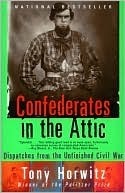More on this book
Community
Kindle Notes & Highlights
by
Tony Horwitz
Read between
November 13 - November 21, 2024
“In school I remember learning that the Civil War ended a long time ago,” he said. “Folks here don’t always see it that way. They think it’s still half-time.”
“You know what they call North Carolina,” Ed Curtis added. “ ‘A vale of humility between two mountains of conceit.’ ” He smiled. “Of course that’s a conceited thing to say about yourself. But at least we’re humble about how much better we are than anyplace else.”
“Southerners are a military people. We were back then, still are today. Every man in here has carried a gun for his country and probably a few of the women, too.”
“What gets me is the heart of the Jews. They were underdogs, they knew they were going to die but didn’t give up the faith,” she said. “Just like the Confederates.”
“The way I see it,” King said, “your greatgrandfather fought and died because he believed my great-grandfather should stay a slave. I’m supposed to feel all warm inside about that?”
fought for the South? There’s some buried here in Charleston.”
The best thing about Southern manners was that they seemed to improve my own, at least temporarily.
Viewed through this prism, the War of Northern Aggression had little to do with slavery. Rather, it was a culture war in which Yankees imposed their imperialist and capitalistic will on the agrarian South, just as the English had done to the Irish and Scots—and as America did to the Indians and the Mexicans in the name of Manifest Destiny.
The banner most Americans now called the rebel flag—a diagonal blue cross studded with white stars and laid across a field of red—served only as a combat standard during the War.
“The South represents the only remaining stumbling block to the imposition of an American police state.” This state, he added, would plunge America into a “New World Order” marked by a “Godless” and “mongrelized” multiculturalism.
honor-bound code of the Old South. One’s people before


